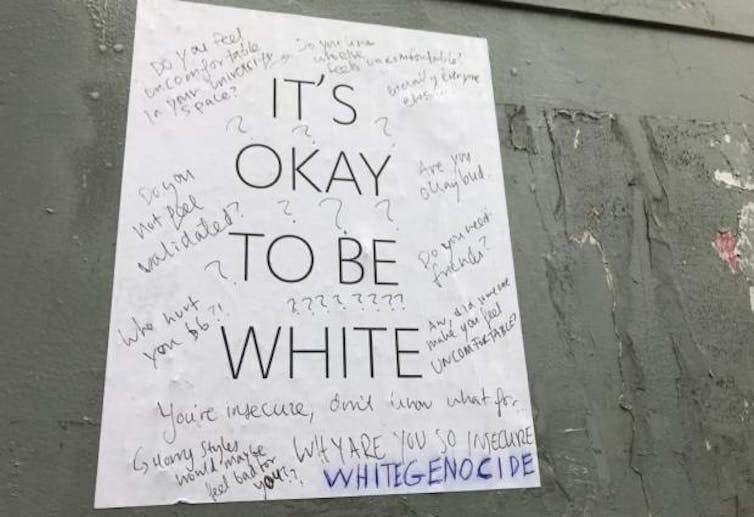Recently, posters were discovered on several walls at the University of Manitoba with the statement, “It’s okay to be white.” Other similar incidents were reported in Halifax, Regina and elsewhere around the world. Most who saw the paper print-outs denounced them as hate propaganda from white nationalists.
Following the incident, some media outlets, including the Winnipeg Free Press, received an email from the alleged poster, who claimed he was a University of Manitoba student who papered the walls.
The student said the posters were a “protest of racially discriminatory ideology” taught at the university. He said “many professors explicitly teach in their courses that it is not okay to be white.” He added that he felt the over-reaction to the posters proves the presence of a “white-phobia” on campus.
One Reddit post argued that “CBC took the bait” when reporting on the posters. To people like those commenting on the Reddit thread, the poster campaign was a benign act meant to highlight liberal bias in mainstream media. But is saying “It’s okay to be white” benign?
Making myths
Meaning is never produced in a vacuum. Statements have historical and cultural contexts and ideology is embedded in the language we use. Written texts can produce meaning, using rhetorical devices, like metaphor and irony.
Things start getting complicated when we mix up the cultural meanings of things for the literal meanings. The French philosopher Roland Barthes said “myths” are created when we confuse cultural meanings for literal ones. We start to believe that culture is literal instead of made. This is known as denotation versus connotation.
When this happens, a statement that is filled with cultural, historical and contextual biases appears natural and ahistorical.
“It’s okay to be white,” appears to be a literal, or denotative, message, but when we read it in context — against the backdrop of institutionalized Eurocentrism and current anti-racist political movements like Black Lives Matter — we see that it is far from benign.
The poster believes that white identities are no longer accepted at the university. He believes a double standard exists in conversations of cultural diversity. This attitude is aligned with the alt-right, a U.S.-based white nationalist movement.
 It’s okay to be white poster photographed on the University of Toronto campus. Tom Yun/The Varsity
It’s okay to be white poster photographed on the University of Toronto campus. Tom Yun/The Varsity
The culture wars
I believe the self-proclaimed alt-right, an offshoot of conservatism that combines elements of racism, white nationalism and populism, is a symptom of postmodern politics of transgression and subversion. It is a symptom of the diffusion of rebellion into mainstream political rhetoric and discourse. My research looks into the ideologies of postmodern culture and the media that includes examining debates about identity politics.
Identity politics is political or social organizing “intimately connected to the idea that some social groups are oppressed.” University identity politics challenged the modern, the dominant white male narratives, that helped to shape and normalize the culture of colonialism and patriarchy. This challenge has been called postmodern.
The far right as a whole is critical of postmodern identity politics, but they unknowingly identify with its practices of expression. What they demonstrate is not a new rise of conservatism, but rather, according to the Washington Post, “a co-opting of 1960s-style liberalism.”
Angela Nagle writes that the online alt-right world is not evidence of the return of conservatism but a turn away from “church-going, upstanding, button-down, family-values conservatism.” It is “the absolute hegemony of the culture of non-conformism, self-expression, transgression and irreverence for its own sake.”
Consumer culture helps build rebels
Postmodern identity politics have been incorporated into popular media through consumer culture. Identity is a big part of branding campaigns, diffusing the politics of new social movements into commercial demands for representation, inclusion, diversity and tolerance.
Consumerism also preaches an ethic of non-conformity. Non-conformists are never satisfied with the status quo, continually seeking new ways to subvert it. For the consumer society, a non-conformist creates demand for new commodities.
Therefore, to be a rebel, to transgress and subvert the perceived status quo, is the dominant popular mode of identity.
If postmodern identity politics means subverting the Eurocentric, patriarchal and capitalist ideologies, what results from the subversion of subversion?
Co-opting the resistance
This month’s cover of Maclean’s magazine features an image of Canadian conservative political leaders, including the premiers of Saskatchewan, Manitoba and Ontario, along with the leader of the federal conservatives, Andrew Scheer, and the leader of the Alberta conservatives, Jason Kenney. The caption that appeared across these men read, “The resistance.”
When the left is positioned as the status quo, those opposing them appear as “resisting.” But resisting what? This “resistance” is the basis of the populist moment in politics.
Populism is a conservative ideology currently reigning contemporary political discourse. Its strategy is to draw attention away from the real problem and shift it onto a false enemy or intruder whose purging will bring renewed harmony.
In the process, the reigning power is depicted as the resistance, appearing sympathetic towards “the people” against an imagined elite.
In contrast, democratic socialists like Bernie Sanders or Jeremy Corbyn, described as “left populists,” oppose the prevailing neoliberal capitalism. They assign blame to the contradictions within the system, rather than some enemy or intruder who disrupted the harmony of the system. “Left populism” is, therefore, a misnomer.
Populism is the strategy of the right in the Trump era. Whether it is the “fake media,” political correctness or migrant labour, Trumpian politics always locates some enemy or intruder. This is the populist strategy of reproducing dominance in the guise of resistance.
This is what is truly troubling about the “It’s okay to be white” campaign. It creates the confusing myth that the ruling ideology is the resistance.
Matthew Flisfeder, Assistant Professor of Rhetoric and Communications, University of Winnipeg
This article is republished from The Conversation under a Creative Commons license.